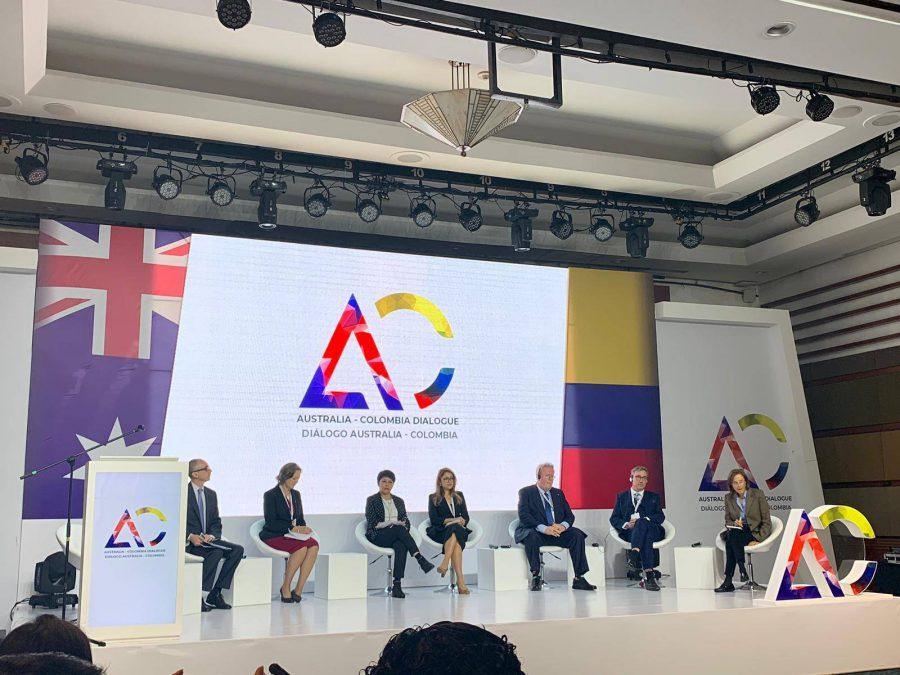Getting to know Latin America: the inaugural Australia–Colombia dialogue
Posted By Stephen Loosley on August 1, 2019 @ 12:51
The only time I had ever seen La Moneda (‘the Mint’)—the presidential palace in Santiago, Chile—was in a newsreel showing the Hawker Hunter aircraft of the Chilean Air Force bombing that magnificent edifice during the overthrow of President Salvador Allende in 1973. Now there’s a statue of the slain president in the square outside.
It was a privilege to talk with senior Chilean officials in La Moneda while I was en route to Bogota for the inaugural Australia–Colombia dialogue [1]. Australia’s ambassador to Chile, Robert Fergusson, had organised an impressive round of discussions with Chilean policymakers and analysts.
Much of the discussion centred on emerging challenges in the Pacific and domestic economic issues in both our countries. In particular, the role of our Foreign Investment Review Board elicited much interest. The return of China as a great strategic and economic power has focused minds just as well in Latin America as it has in Australia and our region.
Australia can do much more with its Chilean relationship, characterised as it is by common interests—particularly through the Pacific Alliance [2] free trade agreement—an absence of tension and a generally positive attitude of mutual respect.
The inaugural Australia–Colombia dialogue took place in Bogota on 19–20 June. Australia’s Department of Foreign Affairs and Trade had endorsed a proposal that had originated with César Alvarez (an ASPI alumnus) from Charles Sturt University and was backed by ASPI.
The track 1.5 dialogue brought together representatives from government and politics, the legislature, business and media, and academia. Business players from the mining sector and academics from the University of Queensland and Charles Sturt University mixed with the Colombian government delegation, including the defence minister and the minister for mines, as well as congressmembers and vice ministers. A congressman from Medellin who declared that ‘Pablo Escobar is dead’ caught the attention of the Australian delegation. Ambassador Sophie Davies and her staff worked diligently to ensure the success of the conference and she handled the Colombian media with aplomb.
Significantly, the Australian Federal Police has its Latin American station in Bogota. Relations with the Colombian authorities appear to be both close and effective. Obviously there are serious criminal challenges that touch Australia, including drug smuggling from the region. Counterterrorism is also high on the bilateral agenda. Colombia is just emerging from a 50-year civil war and lessons for democracies are everywhere to be seen. Indeed, a superb photography exhibition in a Bogota gallery told a moving story of what the war against the FARC was like for rural families and communities caught in the crossfire between the military and the guerrillas.
Given the situation in neighbouring Venezuela, border security and the accommodation of refugees are also constants in Colombian politics. No matter where you are in the world, it seems the policy challenges can be eerily familiar.
Remarkably, my visit to Buenos Aires also finished in the presidential palace, La Casa Rosada. The Australian embassy had received a request from the office of the president for the presidential staff to discuss Australian economic reforms during the Hawke–Keating era. Australian Ambassador Brett Hackett could see the value in this and added the Howard–Costello period to our discussion.
Argentina compares itself with Australia and that often leads to unfavourable conclusions. How had Australian economic reform turned our country around during the period 1983–2007 and could those lessons apply to Argentina for President Mauricio Macri’s administration? The similarities are there in terms of the immense wealth to be found in the agriculture sector alone.
But for Argentina, which entered a period of per capita income decline in 1948, the challenges are often more daunting. For example, as we discussed the Prices and Incomes Accord between the Labor government and the Australian Council of Trade Unions, one of my Argentinian interlocutors observed that there were 17 teachers’ unions in Buenos Aires. There is much interest in Australia among governing and political circles in Argentina, just as there is elsewhere in Latin America.
A shifting geostrategic climate for Australia means that we need to do more to diversify our trade and diplomatic interests, right across the board. We have already demonstrated through the work of the Cairns Group [3], for example, that close cooperation with other middle powers in pursuit of common good can work well. Multilateral approaches suit both Australia and Latin America.
The undoubted success of the Australia–Colombia dialogue raises the possibility of a broader approach on Australia’s part to Latin America. Given the grouping of middle powers to be found on the continent, Australia would do well to consider an Australia–Latin America dialogue. ASPI has built successful dialogues with Japan and Korea, as well as with India and Indonesia. There is an exchange with China. More broadly, there has been original work done by ASPI with southern Africa.
Given Latin America’s interest in the Asia–Pacific region, the idea of a wider dialogue with republics such as Argentina, Chile, Colombia and Peru makes sense. Eventually, Venezuela will return from the excesses of gravity-defying maladministration under President Nicolás Maduro to a more reasoned course. And we must always bear in mind that Brazil is a serious major global player both economically and politically.
César Alvarez and Viviana Espinosa are to be commended very highly for the success of the conference in Bogota. There will be a 2020 dialogue with the Colombians in Australia. We should take advantage of this positive beginning and look to a deepening of relations with Latin America through a more comprehensive annual dialogue.
Article printed from The Strategist: https://aspistrategist.ru
URL to article: /getting-to-know-latin-america-the-inaugural-australia-colombia-dialogue/
URLs in this post:
[1] Australia–Colombia dialogue: https://www.auscoldialogue.org/home
[2] Pacific Alliance: https://dfat.gov.au/trade/agreements/negotiations/pacificalliancefta/Pages/pacific-alliance-free-trade-agreement.aspx
[3] Cairns Group: https://cairnsgroup.org/Pages/wto_negotiations.aspx
Click here to print.
